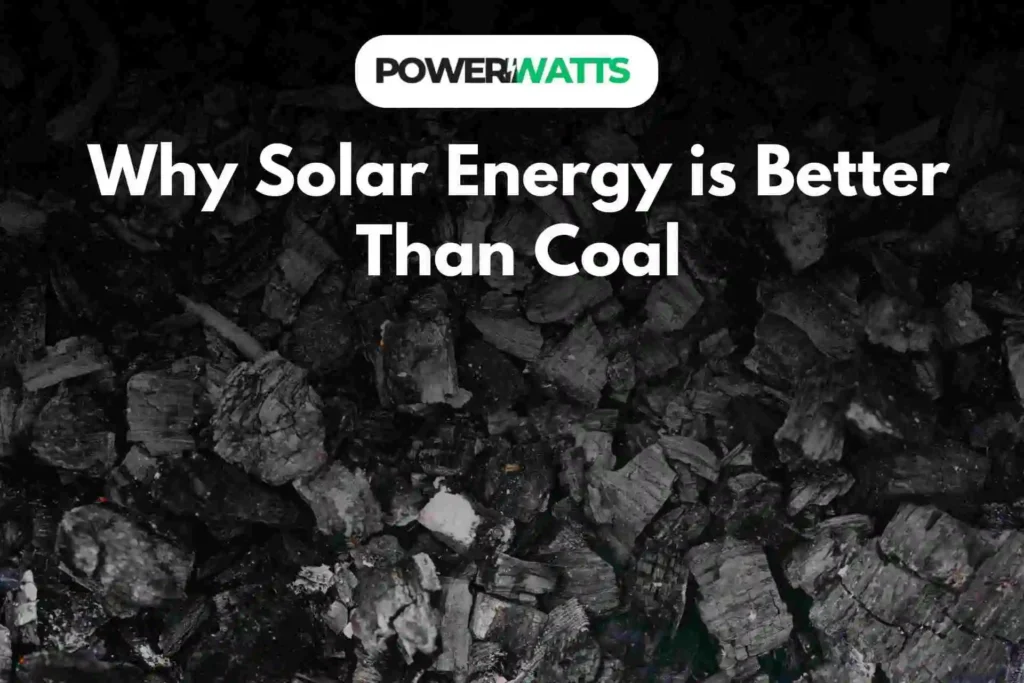Why solar energy is better than coal? The world is at war against climate change and environmental degradation, a scenario that has made the world shift from the use of fossil fuels to cleaner sources of energy. Among the many alternatives, solar energy is a commendable option over coal. Solar energy harnesses power from the sun and presents a number of advantages over coal, which is a rather traditional and highly polluting source of energy.
This article examines many reasons why solar energy stands out in several ways from coal by detailing its environmental, economic, and social advantages.

Environmental Advantages
Reduced greenhouse gas emissions:
Solar Energy: In electrical generation by solar power, no emission of greenhouse gases takes place. No carbon dioxide or harmful fumes are released because the process for conversion of sunbeams to electricity through PV cells or through solar thermal systems is ‘ecologically clean’ and absolutely non-polluting. This reduces the carbon footprint associated with energy production.
Coal: Combustion, in turn, releases large quantities of CO2, the main anthropogenic greenhouse gas responsible for climate change. Other by-products of coal combustion include sulfur dioxide (SO2) and nitrogen oxides (NOx), both contributors to acid rain and smog.
Reduced air and water pollution:
Solar Energy: Solar power plants emit no air and water pollutants in any quantity during operation. This helps preserve air quality and reduces the risk of water contamination.
Coal: Mining and combustion of coal are both very serious sources of air and water pollution. Coal mining can damage habitats directly, while toxic substances released into the water will do severe harm to it. All in all, coal-fired power plants generate particulate matter, heavy metals, and other pollutants harmful to human health and the environment.
Mitigation of Climate Change:
Solar Energy: This decreases dependence on fossil fuels and helps minimize certain factors that enhance climatic change. Solar power emits fewer amounts of greenhouse gases, contributing to the global drive to contain temperature increases within a limit above which the ramifications of climate change will be disastrous.
Coal: Continued reliance on coal is increasing atmospheric CO2 levels, hence contributing to climate change. Environmental consequences of coal global temperature rise and an increase in extreme weather are very threatening for ecosystems and human societies.
Economic Advantages
Lower operational costs:
Solar Energy: The operation and maintenance of these systems are relatively inexpensive. Free electricity is produced for many years in the case of solar power systems, which means that money is saved by the consumer over an extended period. Therefore, the main cost constitutes the initial installation and occasional maintenance, which is pretty insignificant as compared to the fuel costs that keep on going.
Coal requires very expensive operation of coal power plants with expensive fuel and maintenance, and environmental compliance entails high investments. The cost of the coal alone might continue to fluctuate to such an extent that the energy price cannot be indeterminate. Besides, coal plants require considerable investments in pollution control technologies to meet regulatory standards.
JOB CREATION AND ECONOMIC GROWTH:
Solar Energy: An important development has been made in the form of the solar industry, which has emerged as one of the leading sources of employment and fiscal development. Jobs in installation, manufacturing, and research offer a boost to local economies and skilled-work opportunities. Such growth further spurs innovation and investment into clean energy technologies.
Coal: Coal mining and power generation employ some people, but the industry is on the decline due to environmental regulations and competition from cleaner energy sources. Moving away from coal brings about economic disruption to regions with heavy dependence on this mineral, though investment in renewable energy can cushion these impacts through the creation of employment opportunities.
Energy Independence:
Solar Energy: Solar power can be produced locally to decrease the reliance on imported fuels and improve energy security. Distributed solar systems enable households and businesses to generate their own electricity in a manner that shields them from global energy market volatility, thus resilient to supply disruptions.
Coal: This usually involves mining coal from one site and then transporting it miles to the generation plant. This transportation often comes at a very high cost and can be prone to disruption in supply. Countries that depend on imported supplies are also highly vulnerable to geopolitical tension and instability in pricing.

Social and Health Benefits
Improved Public Health:
Solar Energy: Solar energy improves the health of the people by reducing air and water pollution. Smaller amounts of general pollution result in reduced respiratory and heart diseases; this improves general health and reduces the costs spent on illnesses that come from pollution.
Coal: The combustion of coal releases harmful pollutants that cause respiratory problems, heart diseases, and many other health issues. Most communities around coal mines and power plants are always exposed to higher levels of pollution, resulting in adverse health effects and increased medical expenses.
Less Environmental Impact:
Solar Energy: The solar energy systems hardly contribute to environmental degradation the way coal would do. Solar panels can, therefore, be installed on rooftops or on unused land and avoid large-scale changes in land use. Moreover, solar technology is evolving continuously to minimize its environmental impact.
Coal: Other than pollution, coal causes a lot of other environmental hazards. The mining of coal might result in degradation of land, deforestation, and habitat destruction. The degradation of the environment due to the extraction and combustion of coal might be long-term and usually irreversible.
Community resilience and empowerment:
Solar Energy: It provides clean, dependable, and appropriate levels of more affordable power, hence empowering communities through energy access. Distributed solar systems have a high potential for stimulating energy access, especially in remote or underserved areas and they offer a strategic pathway to energy access and economic development.
Coal: Communities reliant on coal face challenges that also involve environmental degradation and health effects. Transitioning to cleaner energy sources secures community resilience and well-being, addresses these issues, and allows for sustainable development.
Technological Advancements and Future Prospects
Technological Innovation:
Solar Energy: Solar technology is one that has been continuously evolving. Its efficiency, storage, and integration have been widely improved. Innovations include more efficient solar panels, energy storage solutions, and smart grid technologies, which enhance both the viability and effectiveness of solar power.
Coal: Despite the improvements in coal technology, from even as far back as the cleaner combustion methods, a lot of the problems associated with coal remain today. Most technological innovations in regard to coal are done for reducing emissions rather than diversifying away from fossil fuel dependence.
2. Cost competitiveness:
Solar Energy: The cost of solar energy has fallen significantly in recent years due to improved technology and economies of scale. In large parts of the world, the price of solar power has become competitive or even lower than that of fossil fuels, which has quite some economic appeal.
Coal: Coal is becoming less competitive in relation to the resources of renewable energy day by day. In many ways, fuel costs, maintenance, and also environmental compliance can raise coal costs above those of solar power.
Conclusion
Solar energy has many advantages in comparison to coal: environmental advantages, economic ones, and social and health-related enhancements. Solar power is also cleaner and more sustainable than coal, as this would result in lower carbon dioxide emissions from greenhouse gases and cut down on pollution while growing the economy. With technology continuously improving and prices decreasing, solar energy is well-placed to play a bigger role in mitigating climate change, reducing health harms, and promoting an energy system that is resilient and just. Shifting to solar energy from coal not only secures the environment but also leads to long-term economic and social well-being.
Get a Quote In case you are interested in integrating an inverter with a solar charger into your power system, do not hesitate to contact us today for your custom quote.


